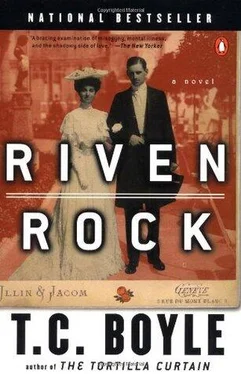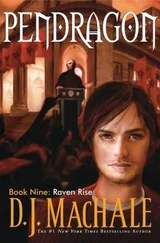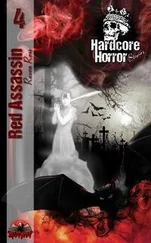T. Boyle - Riven Rock
Здесь есть возможность читать онлайн «T. Boyle - Riven Rock» весь текст электронной книги совершенно бесплатно (целиком полную версию без сокращений). В некоторых случаях можно слушать аудио, скачать через торрент в формате fb2 и присутствует краткое содержание. Год выпуска: 1999, Издательство: Penguin Books, Жанр: Современная проза, на английском языке. Описание произведения, (предисловие) а так же отзывы посетителей доступны на портале библиотеки ЛибКат.
- Название:Riven Rock
- Автор:
- Издательство:Penguin Books
- Жанр:
- Год:1999
- ISBN:нет данных
- Рейтинг книги:5 / 5. Голосов: 1
-
Избранное:Добавить в избранное
- Отзывы:
-
Ваша оценка:
- 100
- 1
- 2
- 3
- 4
- 5
Riven Rock: краткое содержание, описание и аннотация
Предлагаем к чтению аннотацию, описание, краткое содержание или предисловие (зависит от того, что написал сам автор книги «Riven Rock»). Если вы не нашли необходимую информацию о книге — напишите в комментариях, мы постараемся отыскать её.
Riven Rock — читать онлайн бесплатно полную книгу (весь текст) целиком
Ниже представлен текст книги, разбитый по страницам. Система сохранения места последней прочитанной страницы, позволяет с удобством читать онлайн бесплатно книгу «Riven Rock», без необходимости каждый раз заново искать на чём Вы остановились. Поставьте закладку, и сможете в любой момент перейти на страницу, на которой закончили чтение.
Интервал:
Закладка:
There was a cry at their back, rude and insulting, and here came the man — an Italian, she believed, swarthy and black-eyed — rushing down the pier to intercept them. “Hey,” he shouted, addressing Stanley, “where the hell you think you’re going, mister?”
Katherine felt the blood rush to her face. She could scarcely believe her ears. At the same time, her arm was looped through Stanley‘s, and she could feel him stiffen. He gave the approaching guard a wild look, and then the man was there, out of breath, and he reached out to seize Stanley by the arm.
He couldn’t have known what he was doing. Because in that moment all Stanley’s frustrations came to the surface in a molten swelling rush — Maine, his mother, the farce of their honeymoon, his failure in bed — and he erupted. He shook the man off as if he were an insect, sending him careening across the planks in a clutch of spinning limbs and flailing hands. And when the man picked himself up with a curse and came at him again, Stanley brought his umbrella into play, slashing away at his adversary’s face and head until the umbrella was nothing but rag and splinter and the dazed guard, blood wadded in his hair and bright down the front of his jacket, staggered off in retreat.
They were both upset, both she and Stanley, and she held tight to his arm as they made their way through the awestruck crowd, which parted automatically at the sight of Stanley’s grim bloodless face and the shredded trophy that had been his umbrella. “The impudence of that man,” she said. “The first thing I’m going to do when we get home is write a letter to the steamer line — if they can’t hire a gentleman to accommodate the public then they shouldn’t hire anyone at all. You’re not hurt, are you?”
He shook his head, his lips pressed tight.
“Good,” she said, “thank heavens,” but she could feel him trembling and recoiling like a plucked string. They were almost at the boat now, the vast field of it blocking the horizon from view, the crowd closing ranks behind them. Was that her mother, up there, leaning over the rail and waving a handkerchief? No, no it wasn’t.
“I can‘t,” Stanley said suddenly, pulling up short. “I–I’ve got to go back. They’ll have the police.”
“Don’t be ridiculous. The man attacked you — there were witnesses. If anyone need fear the police, it’s him.”
“No,” he said, trembling, and there was that look, the eyes sunk into his head and his lips jerking away from the skirts of his teeth and his teeth clamped and grinding. “They-they’ll put me in jail, I’ll be ruined. Bars,” he said, “iron bars,” and he pulled away from her in a single clonic spasm, turned his back on her and started up the pier in the direction of the gate.
“Stanley!” she called, but he was beyond hearing, already swallowed up in the milling crowd, already lost.
She didn’t see him again till late that night — past ten — and all through her reunion with her mother and dinner and the unwrapping of the little gifts Josephine had brought her back from Paris she was sick with worry. She was sure Stanley had gone off and got himself in some sort of trouble (she thought of the old man at the lake and what might have happened if he hadn’t been able to swim) — trouble no amount of money could get him out of. He was seething. Out of control. Ready to lash out at anyone who got in his way, however unknowingly or innocently. And while her mother nattered on about Prangins and Madame Fleury and how the wedding was still the talk of the village, all Katherine could think of was the police. Should she call them? But what would she say — that her husband was lost? That Stanley Robert McCormick, with all his savoir faire and talent and wealth, couldn’t be trusted on the public streets? That he was mad and disoriented and suffering from sexual hypochondriacal neurasthenia?
She broke down in the middle of one of her mother’s stories about Emily Esterbrook, of the Worcester Esterbrooks, who’d had the stateroom across from hers on the passage back and could whistle the second violin part to Beethoven’s Harp Quartet — all the way through — without missing a note. “Emily’s daughter is engaged to the nicest man,” her mother was saying, when suddenly Katherine began to sob and she couldn’t seem to stop, not even when Stanley finally came banging up the stairs.
“Stanley,” Josephine cried, rising from her chair to greet him, “how nice to see you again,” but then she faltered. Stanley stood there in the middle of her mother’s parlor with the strangest look on his face, as if he didn’t recognize the place at all — or the people in it. There was a smudge of oil or grease on his forehead and the flesh round his right eye was puffy and discolored, as if just that smallest part of him had begun to decay. His jacket had suffered too, the left sleeve hanging by a thread and the right gone altogether. What looked to be blood was crusted round the elbow of the exposed shirtsleeve.
“But Stanley, what’s happened?” Josephine exclaimed, crossing the room to take him by the hand, and she was thinking of her own son, her own dead son, all sympathy and maternal solace, and Katherine’s heart went out to her. As for Stanley — her own reaction to him, that is — she was paralyzed, utterly paralyzed. She couldn’t say What? or How? or even open her mouth. “Here,” Josephine was crooning, “let me see. Here, under the light.”
At first, in the first moment her mother touched him, Stanley seemed to acquiesce, bowing his head and relaxing his shoulders, but then all at once he jerked his hand away as if he’d been bitten. “You stupid old woman!” he shouted, every cord of his throat flexed and straining. “You stupid interfering old woman, don’t you touch me, don’t you dare touch me!”
“Stanley!” Katherine gasped, and suddenly she’d found her voice, angry now as she watched her mother’s face collapse — the kindest woman in the world and she meant nothing but kindness — sore and angry and ready to put an end to this… this insanity. “Stanley, you apologize this instant!”
But he turned on her now, out of control, out of anybody’s control, even his own, his face a whipping rag of rage. “Shut up, you bitch!”
In the morning, early, before anyone was stirring, they went out to Brookline in a private carriage, Stanley sunk so deep in the cushions he was all but invisible from the street, his long legs tented before him, his head and shoulders slouched at the uncomfortable level of Katherine’s buttocks. Both his cheekbones had swollen overnight — he’d been beaten, beaten savagely, she could see that now — and it gave him a look of squint-eyed inscrutability, as if he’d been transformed into a Tatar tribesman while he slept. He said nothing. Not a word. No explanations, no apologies. As soon as they got home, she put him to bed and he slept all through that day and the night and morning that followed.
Then came the procession of psychiatrists, neurologists and pathologists, an unending parade of them marching through the parlor of the Brookline house, tapping, probing and auscultating her shrinking husband, holding up pictures and geometric forms for his comment, questioning him closely about current events and throwing their arms over his shoulder and suggesting a nice walk around the garden. Katherine was frightened. Stanley seemed to be getting progressively worse, slipping away from her, and no one seemed capable of touching him — each physician who came to the door undermined the opinion of his predecessor, as if it were all some elaborate medical chess match. She needed a plan of action, a line of inquiry and therapy to pursue, but all she got was confusion. Outside, the trees stood in tatters, winter advancing, the light fading, the wind gathering, and nothing settled. She wasn’t sleeping well. Meals were a torment. She couldn’t exercise, couldn’t read, couldn’t think. In her desperation, she wired Nettie, hoping for some insight, some shred of wisdom, sympathy, anything. The reply was curt: YOU‘VE MADE YOUR BED STOP NOW LIE IN IT.
Читать дальшеИнтервал:
Закладка:
Похожие книги на «Riven Rock»
Представляем Вашему вниманию похожие книги на «Riven Rock» списком для выбора. Мы отобрали схожую по названию и смыслу литературу в надежде предоставить читателям больше вариантов отыскать новые, интересные, ещё непрочитанные произведения.
Обсуждение, отзывы о книге «Riven Rock» и просто собственные мнения читателей. Оставьте ваши комментарии, напишите, что Вы думаете о произведении, его смысле или главных героях. Укажите что конкретно понравилось, а что нет, и почему Вы так считаете.












